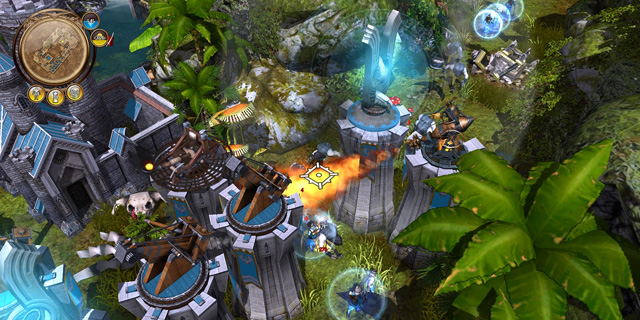
The tower defense genre is a difficult one to enter. If you change it up too much, you’re not really creating tower defense, and if you leave it the same, people will decry it for being just like the tower defense games they’ve already paid for and played. Defenders of Ardania, however, manages to still feel like tower defense, even if the combination of all of the added elements means that none can really take center stage.
Ardania, set in the same world as Paradox’s Majesty games, is at its core a tower defense game. You buy and upgrade towers to keep the enemy forces from storming your keep and destroying it. Where the changes start coming is that your enemy is also playing tower defense. The opposition also builds and upgrades towers to keep you from destroying its keep and winning the battle. (We’ve seen a similar setup in games like PSN-exclusive Comet Crash.) Each level requires two strategies. How do you best keep the enemy units from reaching your keep, and how can you put together waves of your own to defeat the enemy’s tower layout? Each level has a maximum number of towers that can be placed on it so you can’t just fill the level to capacity and defend by overwhelming force. You’ll need to ration your gold though as it’s used for both tower construction and wave creation. There are a number of units at your disposal, and creating the right mix is integral to getting units to the enemy keep and taking it down.
In addition to building towers, upgrading towers, and sending wave out to destroy the enemy keep, you also have magic at your disposal. You can make your own units stronger or faster, or you can make opposing units slower or weaker. Strategy comes into play here, because Defenders of Ardania has no mana. Spell costs come out of your gold reserve, the same gold used to build tower and send out waves of units putting magic at odds with everything else. This means you’ll have to make choices prioritizing whether it would be better to make your current wave stronger or to create a new one to follow after, and if you don’t quite enough towers down you’re cutting into your offensive budget when you have to repair or add to your defensive strength. On paper this trade-off sounds good, but in reality it just meant that I ignored magic whenever I could.
Tower defense games are typically quick-play sorts of games, but Defenders of Ardania differs here as well. Levels, due to the higher complexity than typical TD games, take a long time to complete. The lack of a substantive fast-forward function only exacerbates the long wait time once your defense is good and all you’re doing is creating and sending waves out.
There are a lot of interesting ideas at play in Defenders of Ardania, but they are all vying for your attention and none of them feels as fleshed out as it could have been. I kept wanting the base tower defense elements to take a back seat to the offense, but they never did. There is a game mode available that makes Defenders purely a vanilla-TD game, but the market is crowded with those already, and getting rid of the most compelling element of a game does not make it better.
Pros: Head-to-head tower defense is an interesting, underused concept
Cons: Too many concepts at odds with one another, focus should have been on tower offense



















